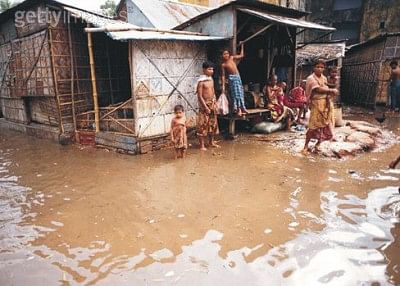Eradicating poverty among slum dwellers

Photo: Slum_Stockbyte
Dhaka is one of the most densely populated and rapidly expanding mega cities in the world. Over 30 million people live in various cities in Bangladesh, which is roughly around 24% of the total population. It is estimated that this number will increase to about 68 million by 2015.
About 49% of the total population of Bangladesh is poor, destitute, vulnerable and living inhuman lives. 20 million people are extremely poor, which is 7% of the total population.
As poor people become desperate for a way to make a living, they rush towards the city lights. It is estimated that 300,000 to 400,000 new migrants come to Dhaka every year. The population of Dhaka doubles every ten years. Unfortunately, the expansion and growth of our cities are not well planned, leaving those searching for new opportunities in a sad situation.
These new migrants often try to look for a roof over their heads in one of the 4,966 slums of Dhaka city, where they may squeeze their bedding down next to one of the 5 million people living below the radar. With almost half the city's population living in slums, it's crucial that we explore ways to develop the means of livelihoods of slum dwellers in order to ensure growth, equity and achievement of the millennium development goals by 2015.
Most slum people come from disaster prone, river eroded and monga affected areas, such as northern chars, haors, and coastal belts. They quickly become an integral part of our source of economic power, contributing to the major work force in the garments, transportation, construction, land development, domestic help, small industries and businesses and waste management sectors. We rely on them, exploit them, grow prosperous on their backs, but we continue to neglect them.
Slum people live in unhealthy and inhuman conditions and face continuous threat of eviction, unemployment, under-employment, hunger, malnutrition, disease, polluted water, lack of safe water supply and sanitation facilities, and harassment from the local power structures.
Although a number of initiatives have been launched by the government, non-government and UN agencies, and though poverty has also been reduced significantly in terms of percentages, the number of poor people is still increasing.
Despite the funds and programmes to alleviate poverty, many extreme poor households remain unassisted. It is an unexpected reality that urban extreme poor have no access to government safety net programmes such as VGD, VGF, old aged pension scheme and 100 days work scheme that are available to the rural poor.
Considering the overall situation, Dushtha Shasthya Kendra (DSK) is implementing a project targeting extreme poor slum dwellers in Dhaka city, with the support from the shiree project (Economic Empowerment Project) funded by UKaid and the government of Bangladesh.
DSK is working on 10,000 households in two slums -- Korail and Kamrangirchar. This project hopes to increase the livelihoods of extreme poor slum dwellers through asset transfers (for example, sewing machines), start-up capital, capacity building for small businesses and other income generating initiatives.
The people in the slums are very entrepreneurial and hard working, and we believe, given the opportunity, they will be able to do well, economically and socially. However, the extreme poor require more than just start-up capital to climb out of poverty. They require forward and backward linkages (markets) for their products. They require a safe home at night. They require primary heath care services, safe water and sanitation facilities.
DSK would like to place a strong argument to the government of Bangladesh and development partners for formulating pro-poor development policies, expanding the social safety net programmes, and providing land ownerships to the urban extreme poor households/slum dwellers besides the other development initiatives. Also, the private sector can get involved to help extreme poor people become part of the formal sector by providing market support.
Urban slum dwellers are contributing significantly to Dhaka's economic growth as they are providing the labour necessary for manufacturing, services and other sectors. So, it is important to bring them into the mainstream economy and to provide support to lift them out of poverty.

 For all latest news, follow The Daily Star's Google News channel.
For all latest news, follow The Daily Star's Google News channel. 



Comments